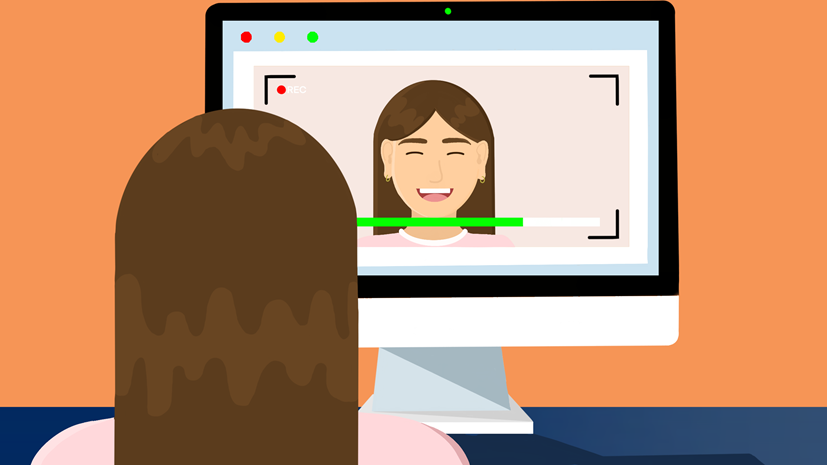Breaking into the workforce can feel next to impossible. Every job listing asks for two or more years of experience for entry-level positions and despite putting your best foot forward, no one seems willing to take a chance on you because they don’t even know you. With every rejection email that pops into your inbox, you lose more and more hope that anyone will ever give you a chance. I’ve often thought when reading one of these emails “If only I had gotten a chance to speak, to show them my work ethic, to talk freely about why I am their best choice and convince them that all I need is a chance to prove it all”.
Well, that is exactly what pre-recorded video interviews allow you to do and their popularity is on the rise. It’s estimated that 6 out of 10 hiring managers are currently using video interviews in their recruitment process, with many planning to use them even more in the future. But what is pre-recorded video interviewing and is it as daunting as it sounds?
What is a pre-recorded video interview?
First and foremost, let’s break down what a pre-recorded video interview is. Sometimes referred to as a one-way video interview, a pre-recorded video interview requires candidates to record video responses to predetermined interview questions that will be viewed later by the interviewer. For recruiters, this means saving time and money, gaining a better insight into candidates earlier on and allowing for more collaboration in the hiring process. While this is great for the recruiter, how does all of this affect you as a candidate?
Promotes Soft Skills
For candidates who are trying to break into their industry of choice, pre-recorded interviews may just be the greatest opportunity you could be presented with in a job application. When you’re first looking to get your foot in the door, it can be difficult to express your true value as an employee in a resume and cover letter, as many of your most valuable skills will come in the form of soft skills – meaning your communication skills, problem-solving skills, time management ability, conflict resolution and work ethic – but your resume can’t reflect these to the standard that a conversation or an interview can.
In a typical application, candidates wouldn’t be given the opportunity to showcase these skills in a face-to-face interview until the second or even third round of the application process – leading applicants with slightly more experience but worse soft skills to advance to the next round while candidates whose skills are better suited for the role, but whose resumes are not as strong, are left behind, not advancing further in the interview process, missing out on the opportunity to showcase their soft skills to the recruiters.
This is where pre-recorded interview process can make a difference for candidates who want to show off their verbal communication skills, professionalism and enthusiasm. As well as this, it gives the recruiters a chance to get a feel for a candidate’s personality and values, which are essential in determining if a candidate will be the right fit for the company’s workplace culture. This is also a major factor considered in the hiring process as it can have a big effect on whether or not a successful candidate will thrive in a particular workplace or simply struggle to synergise with the team’s values and beliefs.

Reducing prestige bias
One-way video interviews allow candidates to showcase their personality, communication skills and professionalism in a matter of seconds – ensuring that candidates are seen as real people, as opposed to just another name on a piece of paper. This, in turn, helps to eliminate prestige bias in the application process. Prestige bias refers to the belief that education from a more prestigious institution results in a higher quality employee, which is not the case but rather an unfair assumption. However, some employers have been known to use prestige bias to narrow down a large pool of applicants, simply because they lack the time and resources to effectively screen candidates. Other employers may have an unconscious prestige bias when reading through an application, which could affect a candidate’s chances when applying to roles using just their resume to showcase their skills.
Pre-recorded video interviews, however, reduce the time of the application process significantly while also presenting a higher quality insight into each applicant – more than a mere resume ever could. This is especially important for candidates who are trying to break into a particular industry, as they have very limited experience and qualifications to show on their resume and should not be held back by the perceived prestige of their educational institute. One-way interviews give these candidates a chance to be judged holistically, and not just as a graduate from a particular university.

Make a lasting first impression
While there are many advantages to pre-recorded interviews, you can’t ignore the unprecedented opportunity they give candidates to speak directly to hiring managers from as early as the initial application, an opportunity which was previously reserved for applicants that made it through the second, third or even fourth round of the application process. This can be seen as both extremely exciting but also extremely nerve-racking for less experienced applicants particularly – though it should be noted that, unlike a live interview, applicants can take a minute or two to prepare their answer when recording a one-way video interview response and even re-record the interview if needed, lessening any anxiety or nerves an applicant may have about the interview process.
Making a good first impression has never gone out of style and pre-recorded interviews allow candidates to make that impression on their terms, in an environment that they are comfortable and familiar with – as opposed to the alternative of face-to-face interviews, where candidates must travel to an unfamiliar environment and where they are expected to present themselves to a group of unfamiliar people who will ask questions they haven’t been able to prepare for. Candidates need to see pre-recorded interviews for what they are, an opportunity to make a lasting first impression.

Final thoughts
Whether candidates are ready for it or not, one-way interviews are only going to get more and more popular as we learn to live in a post-pandemic world but this is far from a bad thing for applicants looking to get their foot in the door. Despite the stigma that may surround the process, one-way interviews are not as daunting as they can initially appear. They assist applicants in showcasing personal skills that can get overlooked in the initial rounds of written applications, despite their necessity for the role. Additionally, they can help lessen prestige bias and anxiety in the application process, allowing candidates to make lasting first impressions that can bolster their application further than a cover letter or resume ever could.
So, the next time you go to apply for a role and see that they’re asking you to record a video response, remember to think of it as an opportunity to showcase yourself. This process is far from a waste of your time, rather it might just be your chance to get your foot in the door and it’s your responsibility not to waste it.

